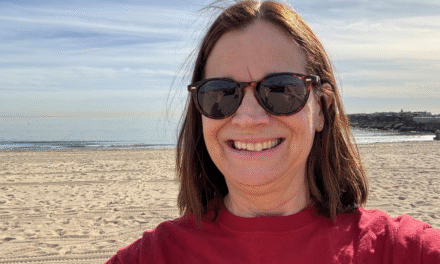Venus* not forgot the counsel her OB-GYN gave her after she went through ovulation. When Venus noticed a small amount of blood in February 2022 despite the fact that she was no longer getting her period, she immediately thought,” See a doctor, if you ever have any kind of bruising.” She set up a meeting with her primary care physician right away. That physician ordered an ultrasound, and when it came back, he told her she had no reason to worry — she did n’t have cancer. A few days after, however, Venus decided to ask for a second opinion during her daily OB-GYN session. That company ordered a colonoscopy. Within a year, Venus learned she had ovarian cancer. Endometrial cancer is increasingEndometrial cancer occurs when tumor tissue enter the uterine lining or tissue. Endometrial cancers, also known as ovarian cancer, is the most prevalent reproductive cancer in women or people who are born as woman. It’s also one of the few cancers with a rising mortality and diagnosis rate, with cases rising by 2 % to 3 % annually for women in all other racial and ethnic groups and by 1 % annually for white women. According to the American Cancer Society, more than 67, 000 fresh cases are diagnosed each year and that 13, 250 people pass away from ovarian cancer each year. Older people are most at hazard, with 60 being the average time of diagnosis. Endometrial cancer is more prevalent in black people than it is in white people, and they are also more likely to pass away from it. Read more: Why Do Black Women Have a Higher Risk of Endometrial Cancer Death? Scientists have been trying to understand why ovarian tumor rates are rising for all people and why Black people have worse outcomes. One possible reason is that fat costs have increased since 1990. Additionally, obesity is a significant risk factor for ovarian cancer because fat tissue may raise estrogen levels. Researchers believe that lower birth rates and women giving birth for the first time at older ages contribute to the rise in ovarian cancer prices globally. Because ovarian tumor is protected by pregnancy and the production of breast milk, that is true. Two uncommon but violent forms of ovarian cancer, known as mucous carcinoma and carcinosarcoma, are more likely to be identified in Black women than white women, according to a major discovery. And these tumors cause worse results than other ovarian cancer types. Additionally, black people frequently have different factors that make their tumors more challenging to treat. They are more likely to possess a particular gene that is less likely to be treated for uterine cancer, which is a type of ovarian cancer. Almost 70 % of Black patients had this higher-risk subtype, while just 35 % of white patients did. In contrast, Black women’s cancers usually have fewer abnormalities. In contrast to other immunological options, black people benefit less from these therapies that are very effective for people because tumors with fewer mutations are less likely to listen to some immunotherapy options. ” Mucous cancer and carcinosarcoma are more aggressive forms of uterine or endometrial malignancies”, said Jayne Morgan, M. D., physician and good collateral professional. ” These two factors make this cancer more dangerous for Black people,” according to research from the journal Endometrial Cancer. A lack of access to healthcare as a result of social factors like income, education, and job type, as well as mistrust in the healthcare system, can result in misdiagnosis or a prolonged diagnosis. But, by the time cancer is discovered, it could be at an advanced level. The risk of endometrial cancer may also increase due to obesity, Type 2 diabetes, and lifestyles that do n’t involve a lot of physical activity. Understand the signs of ovarian tumor ” Truly if you’re earlier menopause, if you’re having uterine bleeding, that should be an alarm”.Other symptoms can include heavier menstrual bleeding, more frequent intervals, bleeding between times and swelling of the uterus lining. Organ said any persistent pelvic pain or stress, unexpected fat loss, or pee issues like frequent urination and difficult urination may also serve as warning signs. ” There are certain things people may look out for and believe,’ Oh, this could be something more severe,'” Morgan said. A group of supportVenus knows she could have been one of the increasing number of Black women with an advanced level analysis.” I’m not saying it’s absolutely ovarian cancer, but it’s something that could be a sign or signal that they need to find this checked out more,” she said. Her healthcare providers ( HCPs ) were able to catch her endometrial cancer early, at stage IA, because she followed her doctor’s advice about postmenopausal bleeding and sought a second opinion when she was informed that she did n’t have cancer. She had a full hysterectomy to remove her uterus but did n’t have to have chemotherapy. Since then, she has been in remission and regularly visits her HCP. ” I was blessed that I had that OB-GYN appointment scheduled”, Venus said. You should n’t make a diagnosis about cancer just by an ultrasound, the primary care doctor said,” as much as I appreciate the primary care doctor trying to move the process along.” Endometrial Cancer Action Network for African-Americans, founded by Kemi Doll, M. D., a gynecologic oncologist with the University of Washington School of Medicine, and the author of a study that found that this tool frequently misses endometrial cancer in Black women. Although Venus experienced physical recovery following her diagnosis and surgery, the experience affected her mental well-being. When her trusted OB-GYN and surgeon left the practice she used, and she had to find new doctors, things got complicated. Venus claimed that when she reached out and joined the organization late last year, ECANA was a significant source of support. Venus was comforted to learn that her new provider had previously worked with Doll when she found another HCP. Venus has also found strength in sharing her story to encourage other women to raise more awareness of endometrial cancer. ” If you’re a woman who’s gone through menopause and you see any bleeding, make an appointment immediately”, she said. ” Do n’t put it off. If you’re only offered an ultrasound, ask for a biopsy. I’m so happy that my gynecologist pushed for that. Only by God’s grace am I here to share what I saw and experienced. *Last name was omitted for privacy reasons This educational resource was made with Merck’s support. ArticlesRelated Articles on the Internet from Your Site
Source link
Endometrial cancer rates are rising, why?





